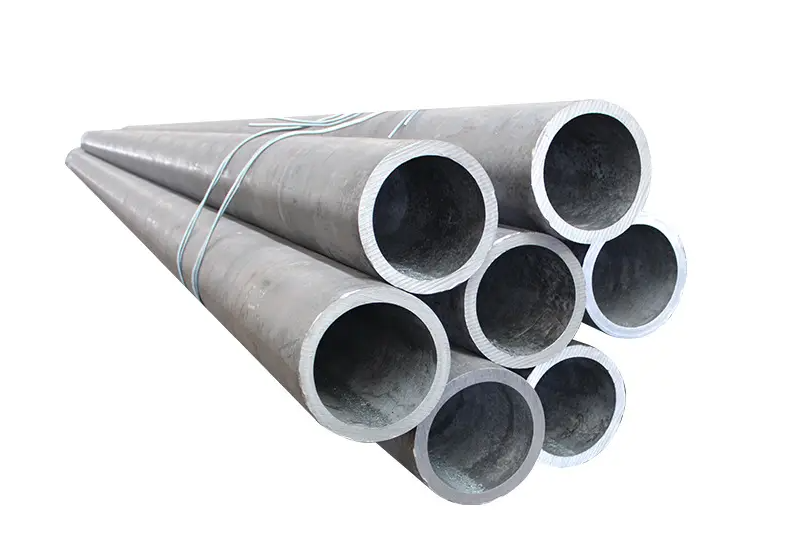ASTM A250 Alloy Steel Pipe

ASTM A250 Alloy Steel Pipe
Introduction
ASTM A250 is a standard specification for electric-resistance-welded (ERW) carbon and alloy steel tubes. These pipes are designed for high-temperature service and are commonly used in boiler, superheater, and heat-exchanger applications. The specification covers several grades, each offering different mechanical properties and chemical compositions to suit various industrial needs.
Key Grades and Chemical Composition
ASTM A250 includes various grades, primarily focusing on carbon and alloy steel. Here are the commonly used grades:
- Carbon Steel Grades: T1, T1a, T1b
- Alloy Steel Grades: T2
Chemical Composition
Below are the chemical compositions for select ASTM A250 grades.
Carbon Steel Grades
Grade T1
- Carbon (C): 0.10 – 0.20%
- Manganese (Mn): 0.30 – 0.80%
- Phosphorus (P): ≤ 0.035%
- Sulfur (S): ≤ 0.035%
- Silicon (Si): 0.10 – 0.50%
Grade T1a
- Carbon (C): 0.05 – 0.15%
- Manganese (Mn): 0.30 – 0.80%
- Phosphorus (P): ≤ 0.035%
- Sulfur (S): ≤ 0.035%
- Silicon (Si): 0.10 – 0.50%
Grade T1b
- Carbon (C): 0.05 – 0.15%
- Manganese (Mn): 0.30 – 0.80%
- Phosphorus (P): ≤ 0.035%
- Sulfur (S): ≤ 0.035%
- Silicon (Si): 0.10 – 0.50%
Alloy Steel Grades
Grade T2
- Carbon (C): 0.10 – 0.20%
- Manganese (Mn): 0.30 – 0.61%
- Phosphorus (P): ≤ 0.025%
- Sulfur (S): ≤ 0.025%
- Silicon (Si): 0.10 – 0.50%
- Chromium (Cr): 0.50 – 0.81%
- Molybdenum (Mo): 0.44 – 0.65%
Mechanical Properties
The mechanical properties of ASTM A250 pipes depend on the grade and heat treatment applied. Here are typical properties for some common grades:
Carbon Steel Grades
Grade T1
- Tensile Strength: ≥ 380 MPa (55,000 psi)
- Yield Strength: ≥ 205 MPa (30,000 psi)
- Elongation: ≥ 30%
Grade T1a
- Tensile Strength: ≥ 380 MPa (55,000 psi)
- Yield Strength: ≥ 205 MPa (30,000 psi)
- Elongation: ≥ 30%
Grade T1b
- Tensile Strength: ≥ 380 MPa (55,000 psi)
- Yield Strength: ≥ 205 MPa (30,000 psi)
- Elongation: ≥ 30%
Alloy Steel Grades
Grade T2
- Tensile Strength: ≥ 415 MPa (60,000 psi)
- Yield Strength: ≥ 205 MPa (30,000 psi)
- Elongation: ≥ 30%
Manufacturing Process
Electric-Resistance-Welded (ERW) Process
ASTM A250 pipes are manufactured using the electric-resistance-welded process, which includes the following steps:
- Slitting: Steel coils are slit to the required width.
- Forming: The slit strips are formed into a cylindrical shape.
- Welding: The edges of the formed strip are welded together using electric resistance.
- Sizing: The welded pipe is passed through sizing rolls to achieve precise dimensions.
- Cutting: The pipe is cut to the required length.
- Heat Treatment (Optional): The pipe may undergo heat treatment to enhance mechanical properties.
Heat Treatment
Heat treatment is crucial to achieve the required mechanical properties:
- Annealing: Heating the pipe to a high temperature followed by slow cooling to soften the material.
- Normalizing: Heating the pipe to a specific temperature and then air cooling to refine the grain structure.
Testing Requirements
ASTM A250 specifies several tests to ensure pipe quality and performance:
- Tensile Test: Measures tensile strength, yield strength, and elongation.
- Flattening Test: Ensures the pipe’s ability to resist flattening without cracking.
- Hydrostatic or Non-Destructive Electric Test: Ensures the pipe can withstand internal pressure without leaking.
- Dimensional Inspection: Ensures the pipes meet specified dimensions and tolerances.
Applications
ASTM A250 pipes are used in high-temperature and high-pressure environments, including:
- Power Generation: Boiler tubes, superheater tubes, and reheater tubes in power plants.
- Petrochemical Industry: Heat exchanger tubes and furnace tubes.
- Refineries: Tubes in catalytic cracking and hydrocracking units.
- General Engineering: Tubes requiring high-temperature strength and corrosion resistance.
Advantages and Limitations
Advantages
- High-Temperature Performance: Suitable for applications involving high temperatures.
- Strength: High mechanical strength suitable for demanding applications.
- Corrosion Resistance: Alloy steel grades offer improved resistance to corrosion.
- Dimensional Accuracy: ERW process ensures precise dimensions.
Limitations
- Cost: Higher cost compared to standard welded tubes due to the alloying elements.
- Complex Manufacturing: Requires precise control over chemical composition and heat treatment.
- Availability: Specific grades and sizes may have longer lead times.
Conclusion
ASTM A250 electric-resistance-welded alloy steel pipes are essential for applications requiring high strength, corrosion resistance, and high-temperature stability. Their superior mechanical properties, combined with rigorous manufacturing and testing processes, ensure they meet the demanding requirements of various industries. Understanding the detailed specifications, grades, and applications of ASTM A250 pipes helps engineers and designers select the right materials for their projects, ensuring safety and efficiency in challenging environments.







